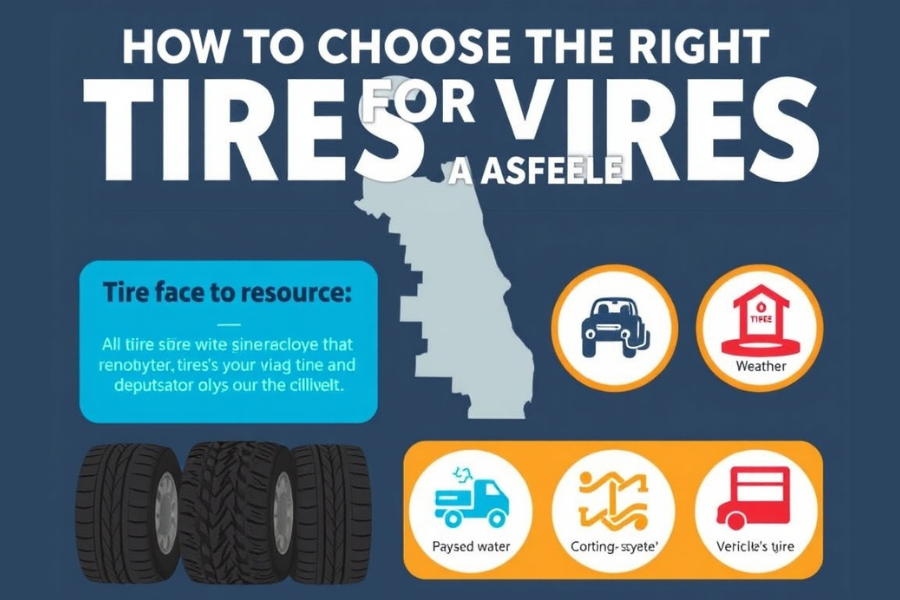When your vehicle needs new rubber, making the right choice can feel overwhelming. Chicago drivers face unique challenges from harsh winters to pothole-riddled streets, making tire selection crucial for safety and performance. This guide will help you make informed decisions about purchasing, maintaining, and caring for your vehicle’s most important contact point with the road.
Understanding Your Tire Needs
Before you start shopping, take time to assess your driving habits and vehicle requirements. Chicago’s climate demands tires that can handle everything from scorching summer heat to subzero winter temperatures. Consider how many miles you drive annually, the typical road conditions you encounter, and your budget constraints.
Your vehicle’s owner manual contains specific recommendations for tire size, load capacity, and speed rating. These specifications aren’t suggestions—they’re engineered requirements that ensure your vehicle performs as designed. Deviating from these recommendations can affect handling, fuel economy, and safety.
New Versus Used: Making the Right Choice
The debate between new tires and pre-owned options depends largely on your circumstances. Brand new rubber offers maximum tread depth, current technology, and manufacturer warranties. They’re the safest option for long-term reliability and come with peace of mind.
However, budget-conscious drivers can find excellent value in quality pre-owned options. When you buy used tires in Chicago, you’re accessing a market that serves thousands of cost-conscious residents. Many used options come from vehicles that were totaled in accidents but had recently replaced rubber, or from lease returns with minimal wear.
The key is knowing what to look for. Quality used options should have at least 6/32 inches of tread depth remaining, show no signs of uneven wear, have no repairs or plugs, and be free from cracks, bulges, or other damage. The manufacture date, stamped on the sidewall, should be within the last six years regardless of tread depth.
Finding a Trusted Provider
Location matters when selecting where to purchase your tires. A local tire shop offers advantages that big-box retailers often can’t match. Local businesses typically provide personalized service, faster turnaround times, and staff who know the specific challenges Chicago roads present.
These neighborhood shops often have relationships with their customers spanning decades. They remember your vehicle, your driving patterns, and your previous purchases. This familiarity translates into better recommendations and service tailored to your needs.
When searching for options in suburban areas, you might buy used tires in Chicago Heights, where several reputable dealers offer quality pre-owned inventory. These suburban locations often have lower overhead costs, potentially passing savings to customers while maintaining service quality.
Essential Tire Services Every Driver Needs
Purchasing tires is just the beginning. Proper installation and ongoing maintenance ensure your investment delivers maximum value and safety.
Professional Installation Matters
Tire installation service involves much more than simply bolting wheels onto your vehicle. Professional technicians mount tires onto rims using specialized equipment that prevents damage to both tire and wheel. They ensure proper bead seating, install new valve stems, and torque lug nuts to manufacturer specifications.
Attempting DIY installation or choosing the cheapest option can lead to problems. Improperly mounted tires can leak air, cause vibrations, or even separate from the rim during driving. The modest cost of professional installation is insurance against these potentially dangerous situations.
Balancing and Rotation: Extending Tire Life
Tire balancing and rotation represents one of the most cost-effective maintenance practices for vehicle owners. Balancing ensures that weight is distributed evenly around each tire and wheel assembly. Even small imbalances cause vibrations that increase wear and reduce comfort.
Rotation involves moving tires to different positions on your vehicle according to specific patterns. Front tires typically wear faster than rear tires due to steering and weight distribution. Regular rotation equalizes this wear, extending the life of your entire set by thousands of miles.
Most experts recommend rotation every 5,000 to 7,000 miles, which conveniently coincides with oil change intervals. Combining these services saves time and ensures you don’t forget this important maintenance task.
When Repair Makes Sense
Not every puncture means replacement. Tire repair service can safely fix many types of damage, saving you the cost of premature replacement. Professional repairs involve removing the tire from the wheel, inspecting the damage from the inside, and installing a combination patch-plug that seals from both inside and outside.
However, repairs have limitations. Damage to the sidewall, punctures larger than a quarter-inch, or repairs in the shoulder area aren’t safe. Similarly, tires with multiple repairs or damage close to previous repairs should be replaced. A reputable shop will refuse unsafe repairs and explain why replacement is necessary.
Navigating Chicago’s Unique Challenges
Chicago drivers contend with conditions that accelerate tire wear. Potholes cause impact damage and misalignment. Salt and chemicals used for winter road treatment corrode wheels and valve stems. Temperature swings cause pressure fluctuations that affect handling and wear patterns.
Consider these local factors when making tire decisions. All-season tires work for many drivers, but dedicated winter tires provide superior traction during harsh months. If you store winter wheels and tires, you’ll actually extend the life of both sets since each experiences less annual wear.
Making Your Decision
Armed with this information, you’re ready to make confident choices about your vehicle’s tires. Start by honestly assessing your needs and budget. Research local providers, read reviews, and don’t hesitate to ask questions about their experience, warranties, and service guarantees.
Remember that tires are your vehicle’s only contact with the road. They affect every aspect of your driving experience—safety, handling, comfort, and fuel economy. Investing in quality rubber and proper maintenance pays dividends in performance and peace of mind.
Whether you choose new or quality pre-owned options, partner with professionals who prioritize your safety and satisfaction. Chicago’s roads are challenging enough without adding tire worries to your daily commute.



